Philippine President Benigno Aquino III signed a landmark law yesterday compensating human rights victims of former dictator Ferdinand Marcos, 27 years after a bloodless “People Power” revolution ended his reign.
Ten billion pesos (US$244 million) will be distributed to potentially thousands of people who Marcos’ security forces tortured, raped or detained, as well as relatives of those who were killed, during his rule.
Speaking at a ceremony in Metro Manila to mark the anniversary of the revolution that was led by his mother, Aquino said the law was part of his government’s efforts to “right the wrongs of the past.”
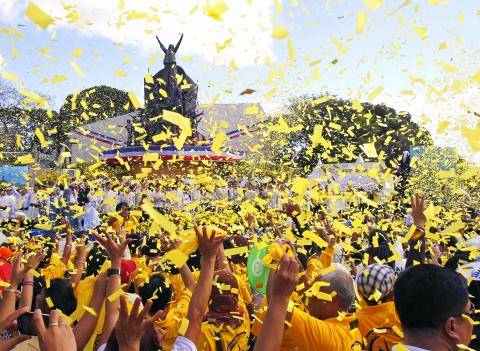
Photo: Reuters
“We may not bring back the time stolen from martial law victims, but we can assure them of the state’s recognition of their sufferings that will help bring them closer to the healing of their wounds,” Aquino said.
Loretta Ann Rosales, an anti-Marcos activist who was tortured by his security forces and now heads the country’s independent rights commission, said the law would finally allow all his victims to feel a sense of justice.
“The law is essential in rectifying the abuses of the Marcos dictatorship and obliges the state to give compensation to all those who suffered gross violations of their rights,” Rosales said.
SYMBOLIC INTENT
Marie Hilao-Enriquez, the chairwoman of Selda, a group which represents victims of the Marcos regime, also welcomed the symbolic intent behind the law, but said the money was too little to have a meaningful impact.
“There are so many victims that when you divide it to everyone it will not result to much,” Hilao-Enriquez said.
Her group represents about 10,000 documented victims, but she said there were many more who had not been officially registered and may now come forward, such as Muslim communities in the remote south of the country.
Under the law, a compensation board will accept and evaluate applications for reparations over the next six months. Those victims will be from when Marcos declared martial law in 1972 to the end of his rule in 1986.
The compensation will come from about US$600 million the government has recovered from Swiss bank accounts that Marcos secretly maintained while he was in power.
The government has accused Marcos and his relatives of plundering up to US$10 billion and has so far recovered about US$4 billion.
After millions of people took to the streets in a military-backed protest, US-supported Marcos fled to Hawaii where he died in 1989.
After returning from exile his relatives have made a remarkable political comeback, while always denying any wrongdoing by the family. Marcos’ famously extravagant wife Imelda is now an 83-year-old congresswoman representing the family’s political stronghold in a northern province.
AMBITIONS
Marcos’ son and namesake, Ferdinand Marcos Jnr, is a senator with public ambitions to become president.
He posted a long statement on his official Facebook page in which he said he had “no problem” with compensating people for rights abuses committed between 1972 and 1986.
However, Marcos said the issue of compensating the “tens of thousands” of human rights victims in the post-Marcos era had been ignored.
“That question is like an elephant in the room that some politicians, the typically glib, sanctimonious and self-righteous, pretend not to see,” he wrote, while insisting he was focused on ways to “unify our country.”
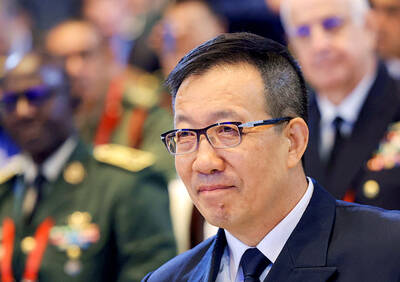
BEIJING FORUM: ‘So-called freedom of navigation advocated by certain countries outside the region challenges the norms of international relations,’ the minister said Chinese Minister of National Defense Dong Jun (董軍) yesterday denounced “hegemonic logic and acts of bullying” during remarks at a Beijing forum that were full of thinly veiled references to the US. Organizers said that about 1,800 representatives from 100 countries, including political, military and academic leaders, were in Beijing for the Xiangshan Forum. The three-day event comes as China presents itself as a mediator of fraught global issues including the wars in Ukraine and Gaza. Addressing attendees at the opening ceremony, Dong warned of “new threats and challenges” now facing world peace. “While the themes of the times — peace and development —
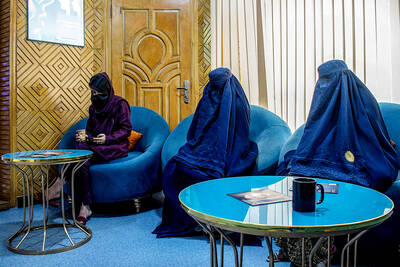
Decked out with fake crystal chandeliers and velvet sofas, cosmetic surgery clinics in Afghanistan’s capital are a world away from the austerity of Taliban rule, where Botox, lip filler and hair transplants reign. Despite the Taliban authorities’ strict theocratic rule, and prevailing conservatism and poverty in Afghanistan, the 20 or so clinics in Kabul have flourished since the end of decades of war in the country. Foreign doctors, especially from Turkey, travel to Kabul to train Afghans, who equally undertake internships in Istanbul, while equipment is imported from Asia or Europe. In the waiting rooms, the clientele is often well-off and includes men
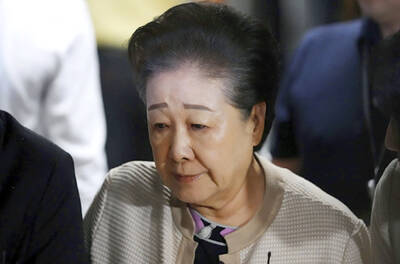
BRIBERY ALLEGATIONS: A prosecutor said they considered the risk of Hak-ja Han tampering with evidence to be very high, which led them to seek the warrant South Korean prosecutors yesterday requested an arrest warrant for the leader of the Unification Church, Hak-ja Han, on allegations of bribery linked to the country’s former first lady and incitement to destroy evidence. The move came a day after the 82-year-old was questioned over her alleged role in bribing former first lady Kim Keon-hee and a lawmaker. Founded in 1954 by her late husband, Sun Myung Moon, the Unification Church has long been the subject of controversy and criticism, with its teachings centered on Moon’s role as the “second coming” and its mass weddings. Followers are derisively referred to as “Moonies.” However, the church’s
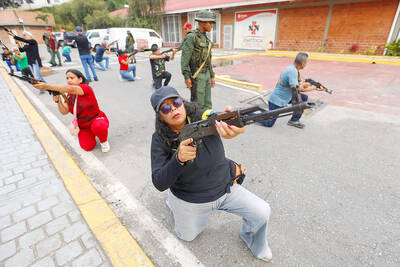
Venezuela on Saturday organized a day of military training for civilians in response to the US deployment in the Caribbean, and amid new threats from US President Donald Trump. About a month ago, Washington deployed warships to international waters off Venezuela’s coast, backed by F-35 jets sent to Puerto Rico in what it calls an anti-drug and anti-terrorism operation. Venezuelan Minister of Defense Vladimir Padrino Lopez has accused Washington of waging “undeclared war” in the Caribbean, after US strikes killed over a dozen alleged drug traffickers off his country’s coast. Caracas also accused the US of seeking regime change, and